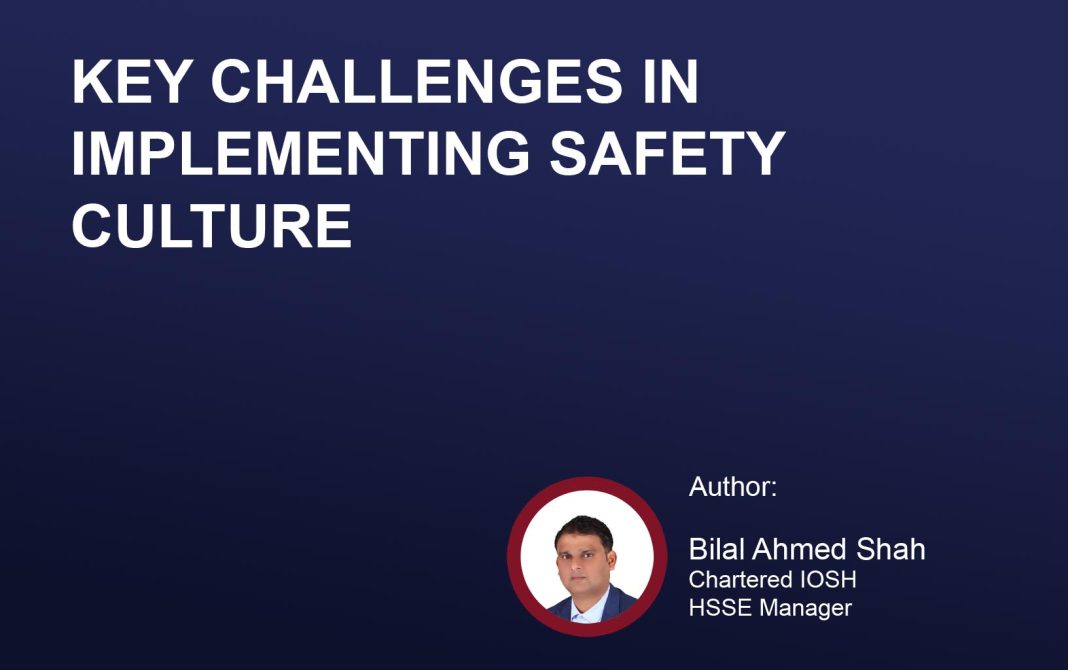Breaking Barriers For Workplace Excellence
Introduction
Creating a strong safety culture within an organization is not just about policies and regulations—it requires a fundamental shift in mindset, leadership engagement, and workforce participation. Many industries, particularly construction, oil & gas, and high-risk operations, struggle to implement a proactive safety-first approach. Despite well-defined regulations, incidents still occur due to behavioral, operational, and structural gaps.
Through 24 years of experience managing corporate safety programs, oil & gas projects, and mega construction initiatives, I have identified key challenges that organizations face when trying to embed safety as a core value rather than just a compliance requirement.
1. Resistance to Change: The Mindset Challenge
One of the greatest obstacles in achieving a safety culture is workforce resistance. Employees often view safety as an added burden, especially in industries where productivity is prioritized over compliance.
Solutions:
- Leadership Involvement – Safety culture must start at the top. When leadership actively promotes and follows safety protocols, employees become more engaged.
- Behavioral Safety Training – Instead of focusing on rules, organizations must educate workers about the benefits of proactive safety, linking it to personal well-being and career longevity.
2. Safety vs. Productivity: The Operational Conflict
Many businesses struggle with balancing safety and efficiency, assuming that strict protocols slow down operations. This results in unsafe shortcuts, increasing the risk of workplace accidents.
Solutions:
- Integrated Safety Frameworks – Aligning safety with workflow efficiency prevents safety from being treated as a separate entity.
- Empowering Supervisors – Safety teams must collaborate with operations managers to ensure risk mitigation strategies complement production targets rather than disrupt them.
3. Training Fatigue: Lack of Engagement & Practical Implementation
Traditional safety training is often generic, repetitive, and detached from real-world scenarios, leading to low engagement and minimal retention.
Solutions:
- Industry-Specific Safety Training – Instead of one-size-fits-all programs, training should be customized per industry—construction workers need different strategies than logistics professionals.
- Case Study-Based Learning – Using real incidents, accident reports, and near-miss analysis enhances training relevance, making workers more aware and proactive.
4. Lack of Safety Accountability Across Teams
A weak safety culture often stems from unclear responsibility distribution—many workers believe safety is only the concern of HSE officers, not a shared responsibility.
Solutions:
- Safety Ownership Programs – Assigning safety responsibilities across all departments ensures that every employee feels accountable
- Recognition & Reward Systems – Acknowledging employees who actively contribute to workplace safety reinforces positive behavior.
5. Compliance Without Commitment: Paperwork vs. Practicality
Many businesses focus heavily on compliance documentation rather than actual safety improvements, causing a disconnect between regulatory adherence and workplace execution.
Solutions:
- Performance-Based Safety Metrics – Instead of just measuring regulatory compliance, organizations should track incident reduction, hazard reporting trends, and worker engagement in safety practices.
- Safety Leadership Programs – Encouraging managers and frontline workers to contribute safety ideas strengthens commitment beyond documentation.
Conclusion
Implementing a true safety culture is about more than rules and audits—it requires behavioral shifts, operational alignment, and leadership commitment. Organizations must reframe safety as a performance-enhancing tool rather than a compliance obligation, making safety an integrated, valued part of daily operations.
By addressing these key challenges, businesses can create safer, more sustainable workplaces, reducing incidents, increasing worker confidence, and ensuring long-term operational excellence.
About the Author:
“Bilal Ahmed Shah is a highly accomplished Senior HSSE Manager with over 23 years of experience in workplace safety and risk management, specializing in mega projects, corporate safety programs, and oil & gas operations. Holding prestigious certifications such as iDiP NEBOSH, Chartered IOSH, and OSHAD Grade A, Bilal has successfully led large-scale HSE initiatives across the Middle East, working with renowned organizations including ADNOC, Aldar, Parsons, and Hill International.
Bilal has an extensive background in health & safety strategy development, compliance enforcement, environmental impact assessments, and risk mitigation for complex infrastructure and industrial projects. His leadership has been instrumental in shaping HSE policies, training frameworks, and audit protocols that enhance workplace safety across construction, refinery, and cultural site operations.
Beyond his executive role, Bilal actively mentors HSE professionals across the Middle East, guiding them in structured career development and technical expertise. His ability to drive proactive safety culture, regulatory compliance, and operational efficiency underscores his commitment to advancing industry standards.”






